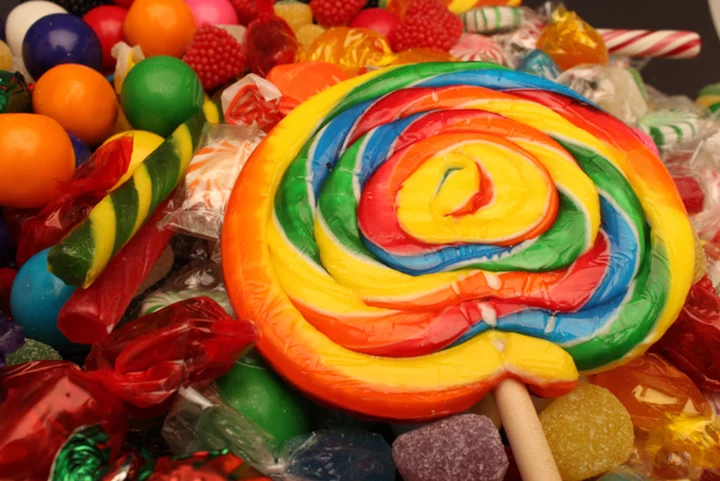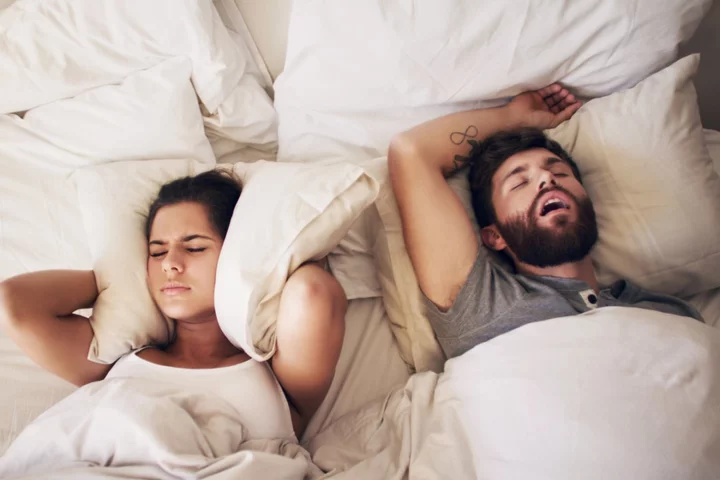
Roundup: Kendall Jenner, Bad Bunny Are Official; Simone Biles Is Back; California Wins Little League World Series
Kendall Jenner and Bad Bunny are official, Simone Biles won the U.S. championship, California won the Little League World Series and more in the Roundup.
1970-01-01 08:00

Tropical Storm Idalia is expected to intensify into a hurricane as it churns toward Florida's Gulf Coast
Tropical Storm Idalia is strengthening quickly as it churns toward Florida, threatening to hit as a major hurricane and bring heavy rains, floods and dangerous storm surge, according to the National Hurricane Center.
1970-01-01 08:00

Ultra-processed food may cause ‘tidal wave of harm’ including stroke and heart attack risk
Two new studies have found conclusive links between the consumption of ultra-processed foods (UPF) with increased cardiac disease risk, including heart attacks and strokes. The research, presented at the annual meeting of the European Society of Cardiology in Amsterdam, found highly processed food sold in stores across the world, such as fizzy drinks, cereals and ready-to-eat meals, may lead to an increased risk of cardiovascular diseases and hypertension. Henry Dimbleby, the UK government’s former food tsar, said the findings should be a “wake-up call” for the country. “Britain is particularly bad for ultra-processed food. It is storing up problems for the future,” he told The Guardian. “If we do nothing, a tidal wave of harm is going to hit the NHS.” One of the studies, conducted by scientists from the Fourth Military Medical University in China, conducted a review of 10 studies that included 325,403 participants and 38,720 cases of cardiovascular disease (CVD) events, including heart attack and stroke. It found a conclusive association between UPF and heart disease risk. Scientists found that a 10 per cent increase in UPF consumption in daily calorie intake is linked to a 6 per cent rise in heart disease risk. Researchers also observed that the lowest risk was at a less than 15 per cent per day of UPF consumption out of total calorie intake. However, heavy UPF consumption “was significantly and positively associated with increased risk of cardiovascular events,” scientists noted. The other research, also presented at the world’s largest heart health conference, assessed the link between UPF intake with CVD and hypertension in a population of middle-aged women in Australia. Scientists, including those from the University of Sydney, assessed health data of about 10,000 women aged 46-55 years who were recruited into the Australian Longitudinal Study on Women’s Health and followed for 15 years. They assessed the contribution of UPF in the daily dietary intake of these women as well as their self-reported heart disease and stroke, and/or hypertension incidences. The women included in the study had an average UPF intake of 26.6 per cent of total food dietary intake. Over their 15 years of follow-up, scientists found 1,038 incident CVD and 4,204 hypertension cases. Among the middle-aged women, scientists observed that a higher UPF intake was associated with higher risk of CVD and hypertension. “These findings lend support to minimising UPF intake as a component of a heart-healthy diet,” scientists wrote in the study. Taken together, the findings hinted that the harm caused by UPF may be more than just due to their high salt and fat content. “If there is something inherent in the processing of foods that is harmful, then that is a disaster,” said Mr Dimbleby. Read More First-of-its-kind study finds laughter is indeed good medicine, especially for the heart How many steps a day can cut risk of early death (and it’s not 10,000) Weight loss jabs improve heart failure symptoms in obese patients – study First-of-its-kind study finds laughter is indeed good medicine How many steps a day can cut risk of early death (and it’s not 10,000) ‘Boy moms’ called out for dubious logic behind teaching their sons to cook
1970-01-01 08:00

First-of-its-kind study finds laughter is indeed good medicine, especially for the heart
A new, first-of-its kind study has demonstrated that laughter can indeed be good medicine – especially for those with heart disease. Laughter therapy can increase the functional capacity of the cardiovascular system that includes the heart, lungs, arteries and veins, found the yet-to-be peer-reviewed research presented at the annual meeting of the European Society of Cardiology in Amsterdam. Researchers, including Marco Saffi from the Hospital de Clínicas de Porto Alegre in Brazil, found reduced inflammation and better signs of health among coronary artery disease patients who engaged in a course of laughter therapy. They found laughter therapy sessions could cause the tissue inside a patient’s heart to expand, potentially leading to increased oxygen flow through the body. Until now, different treatments without the use of drugs have been studied in coronary artery disease patients, but the benefits of rehabilitation using laughter therapy was not fully assessed, scientists said. In the new study, the impact of laughter therapy on the functional capacity, tissue function as well as markers of inflammation in the bodies of patients with coronary artery disease was evaluated. The condition, which is one of the most common diseases in the world, arises when the heart’s coronary arteries struggle to supply the organ with enough blood, oxygen and nutrients. Scientists conducted a clinical trial involving 26 adults with an average age of 64 from August 2016 to December 2020, measuring each of their oxygen uptake and the widening of their main artery when blood flow increases. Researchers also measured levels of molecules in the patients’ bodies, indicative of inflammation such as interleukin (IL)-6, IL-10, tumour necrosis factor (TNF)-alpha, vascular cell adhesion molecule (VCAM) and intercellular adhesion molecule (ICAM). Thirteen of the patients were assigned to the group that underwent laughter therapy by watching two self-selected TV comedy shows per week. The other 13 served as the control group and watched “neutral documentaries”, scientists noted. They said the study is the first controlled clinical trial to evaluate the impact of rehabilitation using laughter therapy on patients with coronary artery disease. It revealed an increase in the body’s peak oxygen uptake and improvements in tissue function as well as the body’s markers of inflammation. The new findings are in line with previous research that suggested having a good laughter session makes the body release endorphins, which are hormones that reduce stress and inflammation and help the heart and blood vessels relax. Based on the new results, presented at the world’s largest heart conference, scientists say laughter therapy may constitute an “effective form of cardiac rehabilitation in this patient population”. Read More How many steps a day can cut risk of early death (and it’s not 10,000) A broad genetic test saved one newborn's life. Research suggests it could help millions of others Snoring before age 50 is a health ‘red flag’, experts suggest How many steps a day can cut risk of early death (and it’s not 10,000) Experts warn that snoring before you turn 50 is a health ‘red flag’ ‘Boy moms’ called out for dubious logic behind teaching their sons to cook
1970-01-01 08:00

South Korea clears path for Hyundai Motor strike -union
SEOUL Hyundai Motor's unionised workers have won permission to go on strike, the union said on Monday, raising
1970-01-01 08:00

Tropical system could threaten the Gulf Coast and Florida this week
An area of showers and thunderstorms in the Caribbean Sea could develop into a tropical system as soon as Sunday, posing a risk to Florida and the Gulf of Mexico coast early next week.
1970-01-01 08:00

Jacksonville gunman was turned away from historically Black university before racist shooting that killed 3 at nearby store, authorities say
The gunman who killed three people at a Dollar General store in Jacksonville, Florida, on Saturday had earlier been turned away from the campus of a historically Black university -- just blocks away from the site of the shooting that targeted Black people, authorities said.
1970-01-01 08:00

Newly declassified US intel claims Russia is laundering propaganda through unwitting Westerners
Russian intelligence is operating a systematic program to launder pro-Kremlin propaganda through private relationships between Russian operatives and unwitting US and western targets, according to newly declassified US intelligence.
1970-01-01 08:00

Snoring before age 50 is a health ‘red flag’, experts suggest
Young adults who snore at night have a significantly higher risk of having a stroke and developing heart disease when they get older, a study has warned. Doctors have said that snoring should be treated as a “red flag” among adults below the age of 50. The study found that young adults who snore are 60 per cent more likely to develop a stroke when they reach middle age, and five times more likely to develop a heart rhythm disorder. The researchers presented their findings at the European Society of Cardiology Congress in Amsterdam. They examined data from 766,000 US adults aged 20 to 50. These included 7,500 adults with obstructive sleep apnoea, a condition that causes interruptions to normal breathing during sleep. This can lead to loud snoring and interrupted sleep as sufferers wake up while struggling to breathe. The study found that, over the 10-year follow-up period, patients with sleep apnoea were 60 per cent more likely to suffer a stroke compared to those who did not snore as frequently. They were also five times more likely to develop atrial fibrillation, a heart condition that causes irregular and often abnormally fast heart rate. Symptoms of atrial fibrillation include heart palpitations, dizziness and shortness of breath. Lead author Professor Sanjiv Narayan, of Stanford University, said: “Sleep apnoea is really common but we sort of ignore it because we think it’s trivial or just a little bit of a nuisance. “Until now no one’s really shown the magnitude of the size of the risk for heart diseases. That’s what really surprised us.” He added that the study looked at “relatively young people” who may not know they are at risk. “If they had a stroke, it would devastate young families. It could take them away from their workplace. It would destroy their lives for the next 40 years.” The researchers suggest that GPs should ask patients regularly if they snore and highlight if as a heart health “red flag” that could show they need more tests or medication. Obstructive sleep apnoea is fairly common and is estimated to affect 1.5m adults in the UK. However, according to the British Lung Foundation, up to 85 per cent of sufferers are undiagnosed and go untreated. Men who are elderly and overweight are particularly prone to sleep apnoea. Interruptions to normal breathing can cause a dip in blood oxygen and cause the heart and blood vessels to strain. Prof Narayan explained: “When you are unable to breathe it raises the pressure in the lungs until you ultimately wake up gasping for breath. That puts a pressure load on the heart, which causes stretch in the heart chambers, and that could cause the atrial fibrillation. “Another theory could be that the oxygen levels in the blood fall for tens of seconds and that could put stress on the heart.” Sleep apnoea can be treated using a CPAP machine, a device that pumps air into a mask that the patient wears over their mouth or nose while they sleep. The NHS also recommends making lifestyle changes such as losing weight if the patient is overweight and exercising regularly, which can improve symptoms. Sleeping on your side may also help relieve sleep apnoea. Read More I feel it in my fingers: Why more of us should start eating with our hands Sean O’Malley sparks outrage after claiming it’s OK if he cheats on his wife Woman praised for refusing to switch seats with child during eight hour flight Liam Payne reveals he was hospitalised due to a ‘serious kidney infection’ ‘Boy moms’ receive backlash for teaching sons how to cook - but for the wrong reason This is how stress affects different parts of the body
1970-01-01 08:00

Liam Payne reveals he was hospitalised due to a ‘serious kidney infection’
Liam Payne is on the road to recovery, as he revealed that he was recently hospitalised due to a kidney infection. The singer, 29, took to Instagram on 25 August to share the news, while he announced that his upcoming tour - which was supposed to start next month - is going to be postponed. He expressed that his doctors advised him to focus on his health, after he’d been hospitalised due to a kidney infection. “It’s with a heavy heart I have to tell you that we have no other choice but to postpone my upcoming tour of South America,” he wrote in the caption, alongside a video of himself. “Over the past week I’ve been in hospital with a serious kidney infection. It’s something I wouldn’t wish on anyone, and doctors orders are that I now need to rest and recover.” While Payne expressed that he was “beyond excited to play” music, he acknowledged that fans will soon be refunded for their tickets. However, the former One Direction member also added that the new dates haven’t been decided yet. “To all of you who have bought tickets, I’m so sorry. We’re working to reschedule the tour as soon as we possibly can, but for now we will be refunding the tickets. So, please look out for updates from your point of purchase,” he wrote. “Thanks as always for the love and support, and look forward to seeing you soon.” In his video, the “Bedroom Floor” singer went on to describe how he’d been a “bit unwell” recently, following the “bad kidney infection”. “We started rehearsals, and I’ve just been advised that now is not the right time for me to be out on the road, trying to recover from this,” Payne said. “I have the best people around me at home trying to help me recover as we speak.” He also added that he hopes that when the time comes, he could “put on an even bigger show” for his fans. According to the National Health Service, hospitalisation as a result of kidney infection can occur for a variety of reasons - such as when a patient is severely dehydrated, unable to swallow or keep down any fluids or medicines, or has a weakened immune system. Fans rushed to the comments section of Payne’s video, where they sent him sweet messages and hoped for him to make a healthy recovery. “Always got your back, champ,” one wrote, while another added: “Get well soon! Love you and here for you forever and always.” A third wrote: “Sending one massive BIG hug your way.” The tour was initially set to kick off on 1 September in Lima, Peru, with his final show in Mexico City, Mexico, on 12 September. In July, Payne made his official return to his YouTube channel, where he discussed how excited he was to go back on tour. He also spoke candidly about his health, after finishing a 100-day rehabilitation stay and was nearly six months sober. Payne went on to admit that prior to sharing the YouTube video, he removed himself from the public eye for his mental well-being. “I just needed to take a little bit of time out for myself actually, because I kind of became somebody who I didn’t really recognise anymore,” he explained. “And I’m sure you guys didn’t either. I was in bad shape up until that point and I was really happy to kind of put a stopper to life and work.” In the YouTube video, the “Strip That Down” singer also discussed his appearance on Logan Paul’s podcast, Impaulsive. Payne expressed regret for some of the things he said about Zayn Malik, after professing that there were “many reasons why he disliked” his former One Direction bandmate. “I think for me, a lot of what I said just came from the wrong place,” Payne recalled. “I was so angry at what was going on around me that instead of taking a look inwards I decided to take it outwards.” Payne said he thought his anger stemmed from frustrations with his career and, rather than reflecting privately, he took his feelings out on others. He added that he “wanted to apologise” for his behaviour. Read More Liam Payne apologises for Zayn Malik comments as he completes 100 days in rehab Zayn Malik discloses ‘underlying issues’ that led to him quitting One Direction: ‘We got sick of each other’ Liam Payne says he’s over 100 days sober: ‘I feel amazing’ ‘Boy moms’ receive backlash for teaching sons how to cook - but for the wrong reason This is how stress affects different parts of the body Chris Pratt’s daughters give him a glittery makeover
1970-01-01 08:00

Georgia renames square after first black Civil War nurse
Susie King Taylor's name replaces pro-slavery former US vice-president John C Calhoun.
1970-01-01 08:00

‘Boy moms’ receive backlash for teaching sons how to cook - but for the wrong reason
Many people are calling out mothers of sons - also known as “boy moms” - for the reason why they’re teaching their sons how to cook, as some people call it a “red flag”. The TikTok trend first began when user Laura Elizabeth Graham shared a video of herself cooking in the kitchen with her young son, as she wrote over the clip: “Making sure my son can cook so he’s not impressed by your daughter’s [Stouffer’s] lasagna.” She continued to write in the video’s caption that her son would need a “home-cooked meal” from his future wife. Meanwhile, fellow “boy moms” also hopped on the trend, as one shared a similar video how she was teaching her son cooking skills so “he’s not impressed by your frozen pizza daughter”. The videos have since sparked a debate, as many users replied that they were teaching their sons to cook “because it’s a necessary life skill for independence.” “Teaching my son to cook because it’s a basic necessity,” one person commented under Graham’s video. Another person proclaimed they were “team daughter-in-law,” while one viewer added that the trend was “screaming red flags”. In response to the TikTok trend, some mothers took the opportunity to point out that showing young boys how to cook - just so that he’s not “impressed” by someone else’s cuisine - only teaches him to expect a higher level of household labour from his future partner. In fact, TikTok user Payal Desai posted a series of videos showing the ways in which she was teaching her sons how to take care of themselves - emotionally and physically - as they grow older. In one video, Desai showed her sons how to clean the dishes and explained why she does it: “So your daughter doesn’t have to deal with a man who was catered to his whole life.” @lauraelizabethgraham He’s gonna need a home cooked meal Felicia ? #boymom #boymomlife #boymomsoftiktok #mamasboy #mommasboy #mamasboys #relatablemom #motherinlaw #motherinlawproblems #momsoftiktok IB: @brontevictoria.capowski ♬ original sound - Laura Elizabeth Graham Many mothers of young boys also joined in, showing the ways in which they were empowering their sons to be more self-sufficient and responsible. Meanwhile, psychologist and mother Amber Wardell reacted to the TikTok trend, saying in a video: “I’m teaching my son to cook so that he will show up for his future wife as though she’s his partner and not his servant.” The ongoing trend to categorise parents as a “boy mom” or “girl dad” reportedly perpetuates gender stereotypes. “The gendering process then continues through quite literally every aspect of that child’s life: the pink or blue newborn hospital beanie, the princess or football player clothing gifted at the baby shower, the jungle or fairyland nursery room decor, and of course, the toy trucks or baby dolls,” Dr Jessica N Pabón-Colón - an associate professor of women’s, gender, and sexuality studies at SUNY New Paltz - explained to Refinery29 in 2021. @payalforstyle No dust here. #dustyson #dustydaughter #trend #boymom ♬ original sound - Bryan Pabón-Colón emphasised that juxtaposing opposite genders, in hashtags like #BoyMom, also reinforces supposed gender differences. Speaking to the outlet, she explained that both the #GirlDad and #BoyMom trend “announces the ‘feminine’ mother’s ability to parent a child whose ‘masculine’ gender is different from hers,” and ultimately suggests that parents of the opposite gender have to try harder to relate to their girls and boys. @sensible_amber This is how we create snobby, entitled men who treat their wives like the help and constantly compare them to mommy dearest. Let’s teach our boys to be self-sufficient, nurturing, compassionate, and supportive. Let’s teach them that their wives do not exist to be their mommies. Most importantly, let’s teach our sons that it is HEALTHY and NORMAL for them to one day leave us and become more attached to their wives than they are to us, and that this is what we WANT for them. Otherwise, we’ll all end up with our boys living with us forever — not because they love us but because no women will have them. They’ll be divorced, lonely and miserable, and we’ll still be cooking their meals. Is this really what we want for our sons? #motherhood #momlife #motherhoodunplugged #motherhoodunited #parenting #boymom #biymomculture #toxicboymomculture ♬ original sound - Amber Although seemingly innocuous, she suggested that this mentality does more harm than good. While the hashtags themselves aren’t harmful, Pabón-Colón emphasised that their stereotypes are limiting. She argued that “the label ‘boy’ cannot possibly contain [a child’s] personality traits,” and that there’s more to any one person than their sex or gender. “Having a vulva does not explain a child’s desire to have a tea party with their dad any more than having a penis explains a child’s desire to climb a tree with their mom,” Pabón-Colón said. The Independent has contacted Laura Elizabeth Graham for comment. Read More Homeowner sparks criticism after telling contractor not to use her bathroom Bride tries on mother’s wedding dress 30 years after parents’ wedding Mom documents at-home abortion to destigmatise abortion pills Schoolboy almost dies from swallowing magnets for TikTok challenge Woman shares honest review of New York City apartment TikTok mom slammed after making 5-year-old son run in 104 degree heat
1970-01-01 08:00
